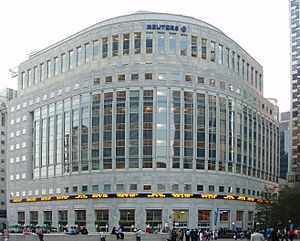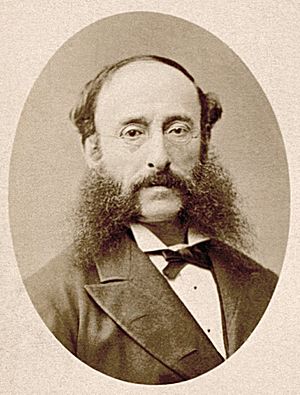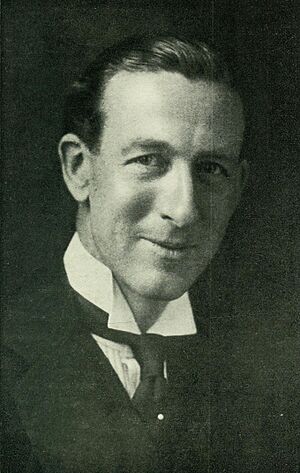Reuters facts for kids

Logo since 2008
|
|

Former Reuters building, London
|
|
| Division | |
| Industry | News agency |
| Founded | October 1851 |
| Founder | Paul Julius Reuter |
| Headquarters | 5 Canada Square, Canary Wharf, London, England |
|
Area served
|
Worldwide |
|
Key people
|
|
|
Number of employees
|
2,500 |
| Parent | Thomson Reuters |
Reuters (![]() i/ˈrɔɪtərz/, ROY-terz) is a news agency owned by Thomson Reuters Corporation. It employs around 2,500 journalists and 600 photojournalists in about 200 locations worldwide writing in 16 languages. Reuters is one of the largest and most trusted news agencies in the world.
i/ˈrɔɪtərz/, ROY-terz) is a news agency owned by Thomson Reuters Corporation. It employs around 2,500 journalists and 600 photojournalists in about 200 locations worldwide writing in 16 languages. Reuters is one of the largest and most trusted news agencies in the world.
The agency was established in London in 1851 by the German-born Paul Reuter. It was acquired by the Thomson Corporation of Canada in 2008 and now makes up the news media division of Thomson Reuters.
Contents
History
19th century
Paul Reuter worked at a book-publishing firm in Berlin and was involved in distributing radical pamphlets at the beginning of the Revolutions in 1848. These publications brought much attention to Reuter, who in 1850 developed a prototype news service in Aachen using homing pigeons and electric telegraphy from 1851 on, in order to transmit messages between Brussels and Aachen, in what today is Aachen's Reuters House.
Reuter moved to London in 1851 and established a news wire agency at the London Royal Exchange. Headquartered in London, Reuter's company initially covered commercial news, serving banks, brokerage houses, and business firms. The first newspaper client to subscribe was the London Morning Advertiser in 1858, and more began to subscribe soon after. According to the Encyclopædia Britannica: "the value of Reuters to newspapers lay not only in the financial news it provided but in its ability to be the first to report on stories of international importance." It was the first to report Abraham Lincoln's assassination in Europe, for instance, in 1865.
In 1865, Reuter incorporated his private business, under the name Reuter's Telegram Company Limited; Reuter was appointed managing director of the company.
In 1870 the press agencies French Havas (founded in 1835), British Reuter's (founded in 1851) and German Wolff (founded in 1849) signed an agreement (known as the Ring Combination) that set 'reserved territories' for the three agencies. Each agency made its own separate contracts with national agencies or other subscribers within its territory. In practice, Reuters, who came up with the idea, tended to dominate the Ring Combination. Its influence was greatest because its reserved territories were larger or of greater news importance than most others. It also had more staff and stringers throughout the world and thus contributed more original news to the pool. British control of cable lines made London itself an unrivalled centre for world news, further enhanced by Britain's wide-ranging commercial, financial and imperial activities.
In 1872, Reuter's expanded into the Far East, followed by South America in 1874. Both expansions were made possible by advances in overland telegraphs and undersea cables. In 1878, Reuter retired as managing director, and was succeeded by his eldest son, Herbert de Reuter. In 1883, Reuter's began transmitting messages electrically to London newspapers.
20th century
Reuter's son Herbert de Reuter continued as general manager until his death in 1915. The company returned to private ownership in 1916, when all shares were purchased by Roderick Jones and Mark Napier; they renamed the company "Reuters Limited", dropping the apostrophe. In 1923, Reuters began using radio to transmit news internationally, a pioneering act. In 1925, the Press Association (PA) of Great Britain acquired a majority interest in Reuters, and full ownership some years later. During the world wars, The Guardian reported that Reuters: "came under pressure from the British government to serve national interests. In 1941, Reuters deflected the pressure by restructuring itself as a private company." In 1941, the PA sold half of Reuters to the Newspaper Proprietors' Association, and co-ownership was expanded in 1947 to associations that represented daily newspapers in New Zealand and Australia. The new owners formed the Reuters Trust. The Reuters Trust Principles were put in place to maintain the company's independence. At that point, Reuters had become "one of the world's major news agencies, supplying both text and images to newspapers, other news agencies, and radio and television broadcasters." Also at that point, it directly or through national news agencies provided service "to most countries, reaching virtually all the world's leading newspapers and many thousands of smaller ones", according to Britannica.
In 1961, Reuters scooped news of the erection of the Berlin Wall. Reuters was one of the first news agencies to transmit financial data over oceans via computers in the 1960s. In 1973, Reuters "began making computer-terminal displays of foreign-exchange rates available to clients." In 1981, Reuters began supporting electronic transactions on its computer network and afterwards developed a number of electronic brokerage and trading services. Reuters was floated as a public company in 1984, when Reuters Trust was listed on the stock exchanges such as the London Stock Exchange (LSE) and NASDAQ. Reuters later published the first story of the Berlin Wall being breached in 1989.
Reuters was the dominant news service on the Internet in the 1990s. It earned this position by developing a partnership with ClariNet and Pointcast, two early Internet-based news providers.
21st century
Reuters' share price grew during the dotcom boom, then fell after the banking troubles in 2001. In 2002, Britannica wrote that most news throughout the world came from three major agencies: the Associated Press, Reuters, and Agence France-Presse.
Until 2008, the Reuters news agency formed part of an independent company, Reuters Group plc. Reuters was acquired by Thomson Corporation in Canada in 2008, forming Thomson Reuters. In 2009, Thomson Reuters withdrew from the LSE and the NASDAQ, instead listing its shares on the Toronto Stock Exchange (TSX) and the New York Stock Exchange (NYSE). The last surviving member of the Reuters family founders, Marguerite, Baroness de Reuter, died at age 96 on 25 January 2009. The parent company Thomson Reuters is headquartered in Toronto, and provides financial information to clients while also maintaining its traditional news-agency business.
In 2012, Thomson Reuters appointed Jim Smith as CEO. In July 2016, Thomson Reuters agreed to sell its intellectual property and science operation for $3.55 billion to private equity firms. In October 2016, Thomson Reuters announced expansions and relocations to Toronto. As part of cuts and restructuring, in November 2016, Thomson Reuters Corp. eliminated 2,000 jobs worldwide out of its estimated 50,000 employees. On 15 March 2020, Steve Hasker was appointed president and CEO.
In April 2021, Reuters announced that its website would go behind a paywall, following rivals who have done the same.
In March 2024, Gannett, the largest newspaper publisher in the United States, signed an agreement with Reuters to use the wire service's global content after cancelling its contract with the Associated Press.
In 2024, Reuters staff won the Pulitzer Prize for National Reporting for their work on Elon Musk and misconduct at his businesses, including SpaceX, Tesla, and Neuralink, as well as the Pulitzer Prize for Breaking News Photography for coverage of the Israel–Hamas war.
Journalists
Reuters employs some 2,500 journalists and 600 photojournalists in about 200 locations worldwide. Reuters journalists use the Standards and Values as a guide for fair presentation and disclosure of relevant interests, to "maintain the values of integrity and freedom upon which their reputation for reliability, accuracy, speed and exclusivity relies".
In May 2000, Kurt Schork, an American reporter, was killed in an ambush while on assignment in Sierra Leone. In April and August 2003, news cameramen Taras Protsyuk and Mazen Dana were killed in separate incidents by U.S. troops in Iraq. In July 2007, Namir Noor-Eldeen and Saeed Chmagh were killed when they were struck by fire from a U.S. military Apache helicopter in Baghdad. During 2004, cameramen Adlan Khasanov was killed by Chechen separatists, and Dhia Najim was killed in Iraq. In April 2008, cameraman Fadel Shana was killed in the Gaza Strip after being hit by an Israeli tank.
While covering China's Cultural Revolution in Peking in the late 1960s for Reuters, journalist Anthony Grey was detained by the Chinese government in response to the jailing of several Chinese journalists by the colonial British government of Hong Kong. He was released after being imprisoned for 27 months from 1967 to 1969 and was awarded an OBE by the British Government. After his release, he went on to become a best-selling historical novelist.
In May 2016, the Ukrainian website Myrotvorets published the names and personal data of 4,508 journalists, including Reuters reporters, and other media staff from all over the world, who were accredited by the self-proclaimed authorities in the separatist-controlled regions of eastern Ukraine.
In 2018, two Reuters journalists were convicted in Myanmar of obtaining state secrets while investigating a massacre in a Rohingya village. The arrest and convictions were widely condemned as an attack on press freedom. The journalists, Wa Lone and Kyaw Soe Oo, received several awards, including the Foreign Press Association Media Award and the Pulitzer Prize for International Reporting, and were named as part of the Time Person of the Year for 2018 along with other persecuted journalists. After 511 days in prison, Wa Lone and Kyaw Soe Oo were freed on 7 March 2019 after receiving a presidential pardon.
In February 2023, a team of Reuters journalists won the Selden Ring Award for their investigation that exposed human-rights abuses by the Nigerian military.
Killed on assignment
| Name | Nationality | Location | Date | Responsible Party |
|---|---|---|---|---|
| Kenneth Stonehouse | British | Bay of Biscay | 1 June 1943 | German Aircraft |
| Hos Maina | Kenyan | Somalia | 12 July 1993 | |
| Dan Eldon | Kenyan | Somalia | 12 July 1993 | |
| Kurt Schork | American | Sierra Leone | 24 May 2000 | |
| Taras Protsyuk | Ukrainian | Iraq | 8 April 2003 | U.S. troops |
| Mazen Dana | Palestinian | Iraq | 17 August 2003 | U.S. troops |
| Adlan Khasanov | Russian | Chechnya | 9 May 2004 | Chechen Separatists |
| Waleed Khaled | Iraqi | Iraq | 28 August 2005 | U.S. troops |
| Namir Noor-Eldeen | Iraqi | Iraq | 12 July 2007 | U.S. military Apache helicopter |
| Saeed Chmagh | Iraqi | Iraq | 12 July 2007 | U.S. military Apache helicopter |
| Fadel Shana'a | Palestinian | Gaza Strip | 16 April 2008 | Israeli Troops |
| Hiro Muramoto | Japanese | Thailand | 10 April 2010 | Thai Troops |
| Molhem Barakat | Syrian | Syria | 20 December 2013 | Syrian Forces/Rebels |
| Danish Siddiqui | Indian | Afghanistan | 16 July 2021 | Taliban |
| Issam Abdallah | Lebanese | Lebanon | 13 October 2023 | Israeli Troops |
See also
 In Spanish: Reuters para niños
In Spanish: Reuters para niños
- Electronic Broking Services, competitor
- List of news agencies
- Media of the United Kingdom
Related to Reuters
- Reuters Instrument Code
- Reuters Insider
- Reuters Market Data System
- Reuters Market Light
- Reuters 3000 Xtra
- Reuters TV
Related to Thomson Reuters
- Thomson Reuters Business Classification
- Thomson Reuters Citation Laureates
- Thomson Reuters Foundation
- Thomson Reuters Indices
- Thomson Reuters/Jefferies CRB Index
- Thomson Reuters league tables
- Thomson Reuters Messenger
- Thomson Reuters Realized Volatility Index



